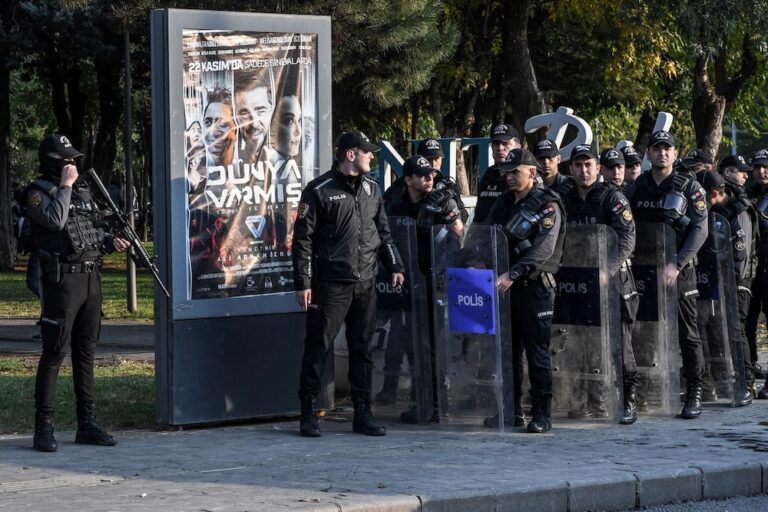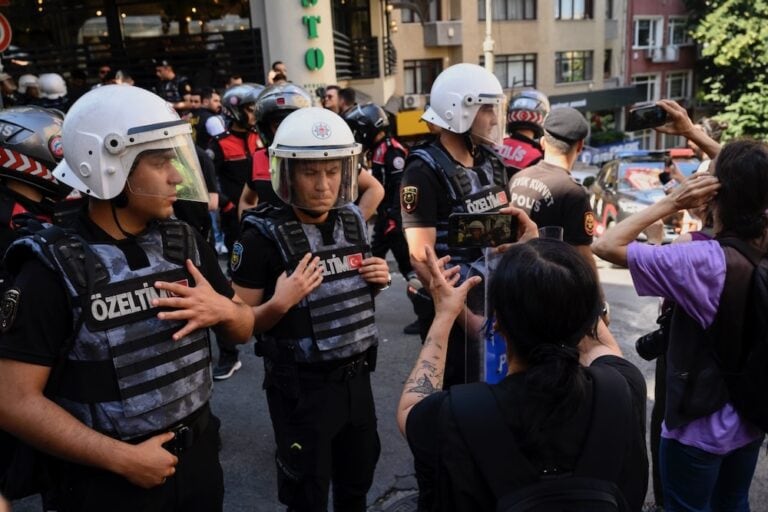(BIANET/IFEX) – The following is a 13 March 2008 BIANET capsule report: Chief of Army: “I am Open to Criticism” Chief of General Staff Yasar Büyükanit expressed in an interview that he was open to criticism. So why are so many people are taken to court for “denigrating the armed forces”? Speaking to journalist Fikret […]
(BIANET/IFEX) – The following is a 13 March 2008 BIANET capsule report:
Chief of Army: “I am Open to Criticism”
Chief of General Staff Yasar Büyükanit expressed in an interview that he was open to criticism. So why are so many people are taken to court for “denigrating the armed forces”?
Speaking to journalist Fikret Bila of the “Milliyet” newspaper, Büyükanit said: “You know me, I am open to criticism. But when there are insults involved, that’s different. I don’t tolerate the Turkish Armed Forces being insulted. I have been wearing this uniform for 53 years.”
Speaking before a symposium on Global Terrorism and International Cooperation, Büyükanit further said that he would be speaking with US Vice President Dick Cheney: “We should not avoid talking to each other. The more we speak to each other, the better we know each other. Problems are solved by talking, not by being silent.”
This astonishing willingness to dialogue may surprise those who have been following how those who “talk” about the army have been treated. The General Staff, led by Büyükanit, has filed complaints against dozens of journalists and rights activists for their comments on the army. There are plenty of examples in the last four months:
There was a complaint filed against writer Gültekin Avci over his book “The Republic of the General Staff: The army’s state or the state’s army?” published by Metropol Publications. The author has been accused of “denigrating the armed forces” under Article 301.
Journalist Nese Düzel of the “Taraf” newspaper faces prosecution under the same charges because of an interview she conducted with Samil Tayyar. Headings in the interview included: “The bomb in Semdinli was an Ergenekon job” and “Ergenekon organised the founding of Hizbullah.” Ergenekon is an ultra-nationalist criminal organisation against which a security operation was recently conducted. There are retired army officers in the gang.
Giving a statement in court, Düzel said that the aim of the interview was to show the existence of criminal organisations within the state, not to denigrate the Armed Forces.
Eren Keskin, lawyer and former head of the Istanbul branch of the Human Rights Association (IHD), has been put on trial under Article 301. In addition, the Istanbul Bar Association has initiated a disciplinary investigation. Keskin said in an article in “Der Tagesspiegel” that the attack on the State Council in 2006, in which one judge was killed, had “served to strengthen the order of the laical, authoritarian and military state.”
Writer Osman Tiftikci and publisher Sirri Öztürk of Sorun Publications have been on trial under Article 301 for the last two years for a book entitled “The evolution of the army from Ottoman times to today.”
Journalist Perihan Magden has previously faced a trial for an article entitled “Conscientious objection is a human right.” She faced a three-year prison sentence but was acquitted. A second trial against her continues.
Sociologist Ismail Besikci faced trial under Article 216 (inciting the public to enmity and hatred) for an article entitled “We did not talk, we repressed it”, published in the “Popüler Kürtür Esmer” magazine in December 2005. Magazine representatives Ferzende Kaya and Mehmet Ali Izmir had also faced prosecution. The trial was dropped because too much time had lapsed.
A case against journalist Umur Talu, who writes for the “Sabah” newspaper, was dropped by the prosecution. He had written an article entitled “Are these impossible?” reporting on the complaints of low-ranking soldiers. He was accused of “damaging relations between ranks.”
These are only some of the examples of the harassment which journalists and rights activists face when attempting to criticise the army.


